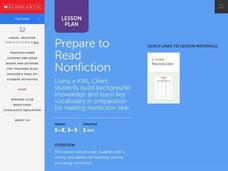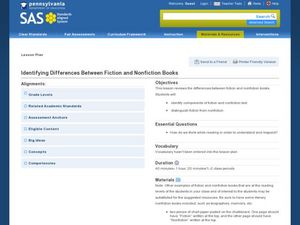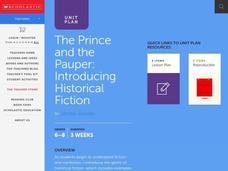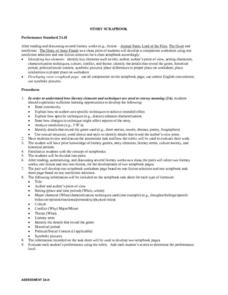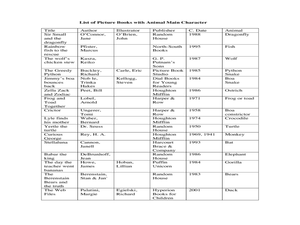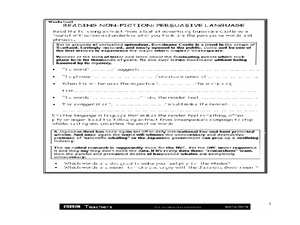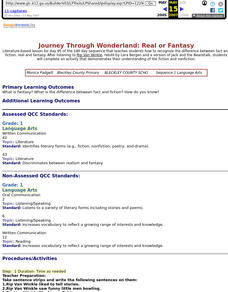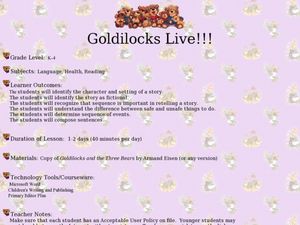Curated OER
Researching the Past
Learners research the western movement in order to learn note taking strategies with nonfiction texts. They use the Internet to search for important information about the western movement using the Cornell Notes note-taking system. They...
Curated OER
Comprehension Skills: Evaluate Using Fiction Stories and Aesop's Fables
Primary readers investigate several comprehension skills in the ten lessons of this unit. Forming opinions about stories, comparing stories to each other, using Venn Diagrams, and applying the ideas from a story to real life situations...
Curated OER
Prepare to Read Nonfiction
Young scholars get an introduction to using KWL Charts as tools for reading nonfiction. They study unfamiliar words and share what they already know about the topic of the non-fiction selection and use this knowledge to help prepare to...
Pennsylvania Department of Education
Exploring Key Ideas and Details in Fiction and Nonfiction
Third graders participate in activities to differentiate fiction from nonfiction. For this fiction lesson, 3rd graders describe the elements of a fiction story. Students compare and contrast fiction and non fiction elements. Students...
Pennsylvania Department of Education
Comparing Key Ideas and Details in Fiction and Nonfiction
Students recognize the differences between fiction and nonfiction texts. In this genre study lesson, students discuss what nonfiction means and write the definition. Students listen to a read aloud and vote whether the text is fiction or...
Curated OER
Text Elements of Fiction and Nonfiction
Second graders examine the text elements associated with fiction and nonfiction texts. In this text elements lesson, 2nd graders listen to Anansi and the Moss Covered Rock by Eric A. Kimmel. They take formative assessments to determine...
Curated OER
Identifying the Theme in a Story
Students recognize Theme through the use of simple, short stories. Using Pro Quest, students begin by researching the literary element, theme, and how it can be identified. They then identify the themes in Aesop's Fables and other short...
Curated OER
Identifying Differences Between Fiction and Nonfiction Books
Students explore the differences between fiction and non-fiction book. In this genre study lesson, students read examples of fiction and non-fiction and identify the characteristics of each genre. Students list the characteristics on a...
Curated OER
Understand the Difference Between Fiction and Non-Fiction
In this fiction and non-fiction worksheet, students cut out 9 sentence strips, read them, and classify each of them as fact or fiction.
Curated OER
Irony in Poetry and Prose (Fiction and Non-fiction Texts)
Middle and high schoolers examine the impact of irony in poetry and prose. In this figurative language lesson, they read instructor-selected literature and identify uses of irony. Then they discuss how irony enhances literature.
Curated OER
Fiction and Nonfiction
Fourth graders differentiate between fiction and nonfiction using the books "Sarah Plain and Tall" and "A Day in the Prairie." They develop a list of information that they learn from the text, and create an information web. Students...
Curated OER
The Prince and the Pauper
Mark Twain, the famous American author, is often studied in the school system. Use "The Prince and the Pauper" to analyze the differences between the text and its video version. This activity includes several culminating project ideas...
Curated OER
Non-Fiction Animal Picture Books
Students complete a multi-activity unit using research to create their own book about an animal of their choice. After discussing the elements of non-fiction texts, they use internet research to explore an animal of interest to them. ...
Curated OER
Story Scrapbook
Students develop a comparison worksheet using one non fiction book and one fiction book they have read to be put into a class scrapbook. In their comparison students must have title, author, point of view, setting, characters, and other...
Curated OER
Reading Non-Fiction
Learners identify the key features of printed non-fiction texts. In this deciphering texts lesson, students watch a video clip of a news program and a children's program to compare presentations. Learners also identify characteristics...
Curated OER
Rachel's Life is in a Hole
Explore how lack of access to water impacts peoples' lives in poor countries. Through text reading and discussion, middle schoolers are presented with the story of a young girl who lives and functions with limited water resources. They...
Curated OER
Find an Animal! Find a Book!
Young scholars identify the themes of different books by classifying their genre. In this genre lesson, students examine a specific animal by reading both a nonfiction and fiction book about the species. Young scholars compare the...
Curated OER
A House is a House for Me: Library Skills for Young Readers
Read Mary Ann Hoberman's book A House is a House for Me to introduce the idea that a library is a house for shelves of books. Young readers practice alphabetizing in the picture book (easy fiction) section of the library. They learn how...
Curated OER
Reading Non-Fiction: Persuasive Language
In this persuasive text activity, students read an excerpt from an advertising leaflet and identify the persuasive words and phrases used in the text. Students then read the text about a Greenpeace campaign to identify emotive language.
Curated OER
Journey Through Wonderland: Real or Fantasy
First graders recognize the difference between fact and fiction, real and fantasy. After listening to Rip Van Winkle, retold by Lara Bergen and a version of Jack and the Beanstalk, 1st graders demonstrates their understanding of fiction...
Curated OER
Establish the Theme
Second graders explore the topic of nature. In this detective lesson, 2nd graders review non-fiction materials on nature and identify text, headings, diagrams, graphs, to establish the theme of the book.
Curated OER
Genres, Genres Everywhere
Young readers assume the role of Genre Sleuths to investigate the characteristics of folktales, fantasies, and mysteries. For this session you will need to collect a variety of books on a topic you have been studying. Groups then examine...
Curated OER
Goldilocks Live!!!
Study story elements with your young learners. Read Goldilocks and the Three Bears and discuss the order of events by making a story panel out of butcher paper. Sentences are given as suggestions for the panel, though you may compose...
Curated OER
Produce a Nonfiction Text
In this language arts instructional activity, middle schoolers look for the facts and create several nonfiction texts while including useful information for the reader.




